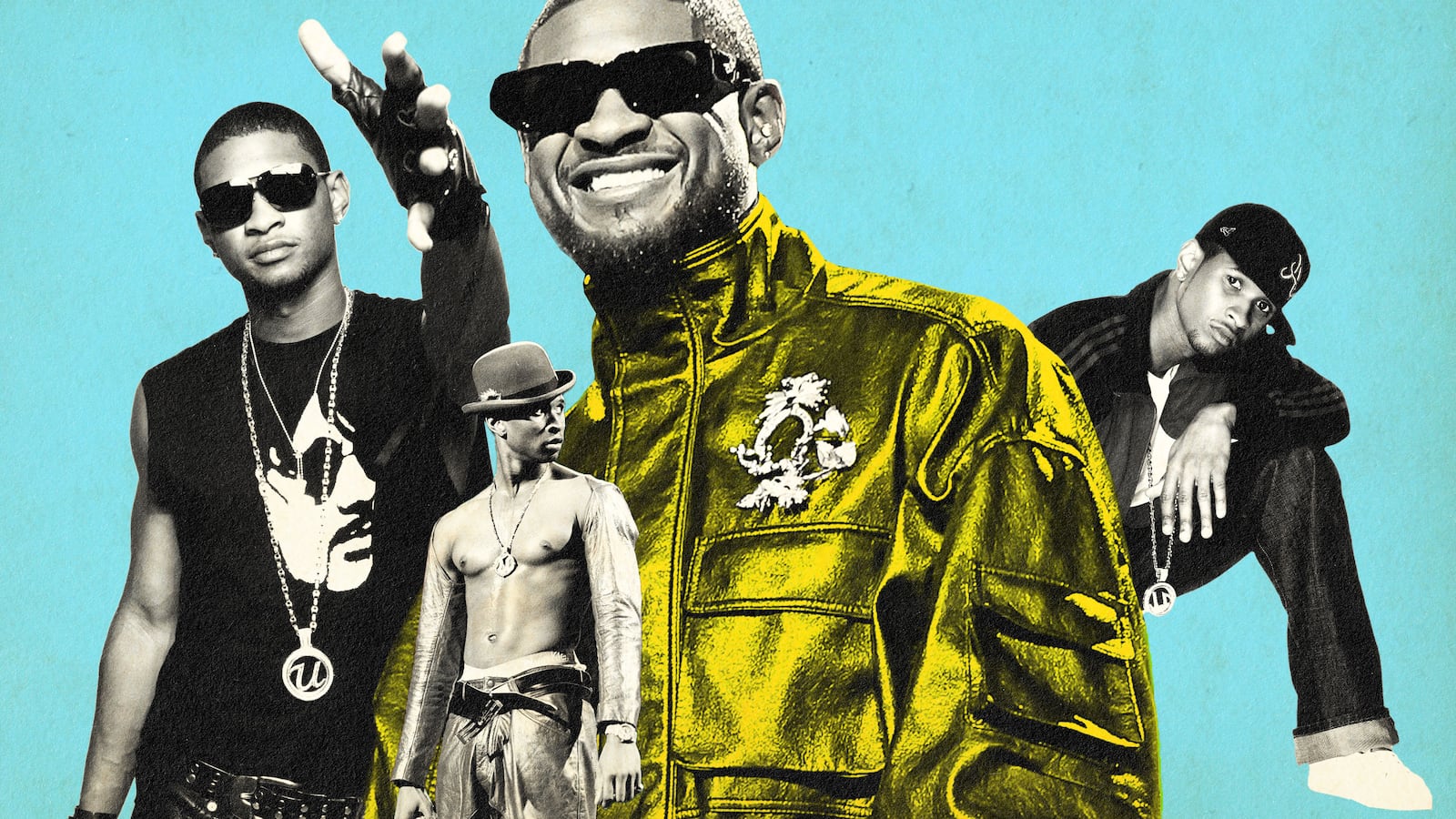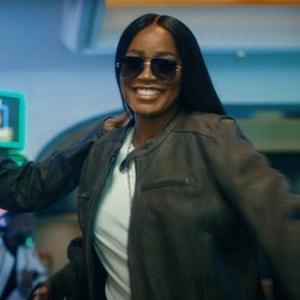Usher’s Super Bowl LVIII halftime performance is one of the most hotly anticipated in recent memory. The eight-time Grammy winner has a repertoire that stretches back to the early 1990s and continues to this day—and on top of that catalog, he’s a consummate showman who remains one of the greatest live performers in music. No doubt about it: This is going to be a show.
Moreover, this Super Bowl performance comes as a proverbial capper for what has been a remarkable recent resurgence for Usher, a towering figure in R&B who transcends eras and generations. And while fans and bookies alike debate which select hits he’ll manage to cram into his 15-minute set, the real question is: How did Usher arrive at this moment—and what took so long to get here?
It’s easy to forget, but Usher Raymond IV was just 14 years old when he debuted with “Just Call Me a Mack,” a single that generated some noise but didn’t exactly set the world on fire when it was released on the Poetic Justice soundtrack in 1993. He’d moved with his family from Tennessee to Atlanta to pursue a music career, but once he did land a record deal, he found himself transplanted to New York City, recording an album executive produced by Sean “Diddy” Combs and growing up way too fast. Still, his self-titled debut was a better-than-advertised collection of mid-’90s hip-hop soul. And though it made some people uncomfortable with such disarming maturity coming from a teenager, it showcased the undeniable star power that he had even at the earliest stages of his career.
And yet, Usher got a lukewarm reception, as it landed right at the height of a ’90s boom in platinum-selling, high school-aged R&B singers. Tevin Campbell, the teenybopper idol of the time, had debuted at the dawn of the decade, with fellow newcomers Brandy and Aaliyah showing up in 1994 with star-making hit singles. Usher wasn’t as fortunate; his album debuted at No. 167 on the Billboard 200 chart. But whatever didn’t happen for Usher during his first album’s run only served as the first act for what would become a definitive career.
Make no mistake: Usher has become the defining star of that era of R&B luminaries. He was part of the first generation to come of age in the wake of Michael Jackson, Whitney Houston, and Janet Jackson; part of the age group that grew up with Black global pop stars who announced a new world order in which Black singers wrested the spotlight from white guys with guitars. Rock bands were still popular, sure, but their tenure as standard-bearers for industry success would begin to rapidly decline amid the rise of Michael and Whitney. And even though those ’80s icons set that paradigm shift in motion, it would be Usher and his contemporaries who fully took advantage of the doors that had been thrust open for them.
After that disappointing debut, Usher’s commercial run from 1997 to 2006 made him one of the premier artists of his generation. Albums like My Way, 8701, and Confessions became cornerstones of the late ’90s and early 2000s, as Usher became a fixture on MTV’s Total Request Live and BET’s 106 & Park, deftly maneuvering around supposed rivals like Ginuwine and Justin Timberlake to make a lane that was all his own.
By the late 2000s and into the 2010s, R&B fans were beginning to wonder where the genre’s mainstream was heading. EDM, trap-influenced Autotune crooning, and moody “alternative” sounds seemed to be the standard, and Usher genre-hopped as times changed and tastes shifted. He deftly delivered latter-day hits like “O.M.G.” and “Climax” that showed he was more than capable of adapting, even as most of his ’90s peers were starting to tour on their greatest hits or try their hand at reality TV fame. His stint hosting The Voice notwithstanding, Usher was able to remain vital as a musician, even as a new generation came to the fore.
Indeed, Usher has maintained a cross-generational appeal that eludes even the greatest artists in virtually any respective era. Save for perhaps Mary J. Blige, there aren’t many of his contemporaries who can say they have the kind of reach that he has; capable of filling stadiums in the 2020s, looking as natural on NPR as he does in Las Vegas, and dropping new music that buzzes with invention. Sometimes when an artist is consistently present in pop culture, it’s easy to dismiss the work ethic and talent it takes to sustain that position. Usher is a legacy artist now, but he still seems to be working harder than almost everybody.
And he’s done it with the kind of scrutiny one would expect for a celebrity who's been in the spotlight for three decades. For much of the 2000s, his personal life seemed intertwined with his music; his highly publicized breakup with TLC’s Rozonda “Chilli” Thomas was the specter that haunted 2004’s blockbuster Confessions, and his divorce from Tameka Foster in 2009 was the backdrop for the following year’s Raymond vs. Raymond. Even through later career lulls and personal storms—including the tragic death of his stepson in 2012, and another separation from his second wife, Grace Miguel—he’s been able to retain his stature. That’s truly the measure of longevity; not that you have a spotless career, but that you can weather the valleys in between various peaks.
His 2023 Vegas residency (and an extremely well-received Tiny Desk Concert in 2022) reminded anyone who may have forgotten that he’s still got the goods. And this week, he’s shrewdly released his ninth studio album, Coming Home, in the run-up to his biggest performance yet—one that he’s said will be both a salute to greats of the past and a celebration of his own career.
That seems all too fitting. Usher is a product of the ’90s, influenced by the Motown, Philly soul, funk, dance, and new jack swing that came before him, and he remains a torchbearer of that beloved era. In the same way that the Motown tradition lived through Michael Jackson, who then pushed it forward into the MTV generation, or the way that funk’s heritage was carried by Prince as he expanded on the genre’s musical vocabulary, Usher isn’t just an emissary for ’90s R&B—he redirects its spirit into something altogether contemporary. His entire career connects the lineage from whence he sprung to the landscape he still influences to this day.
Why would his Super Bowl show be any different?








